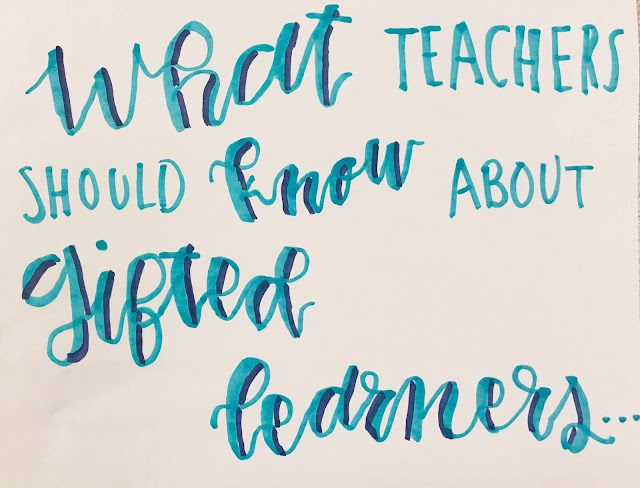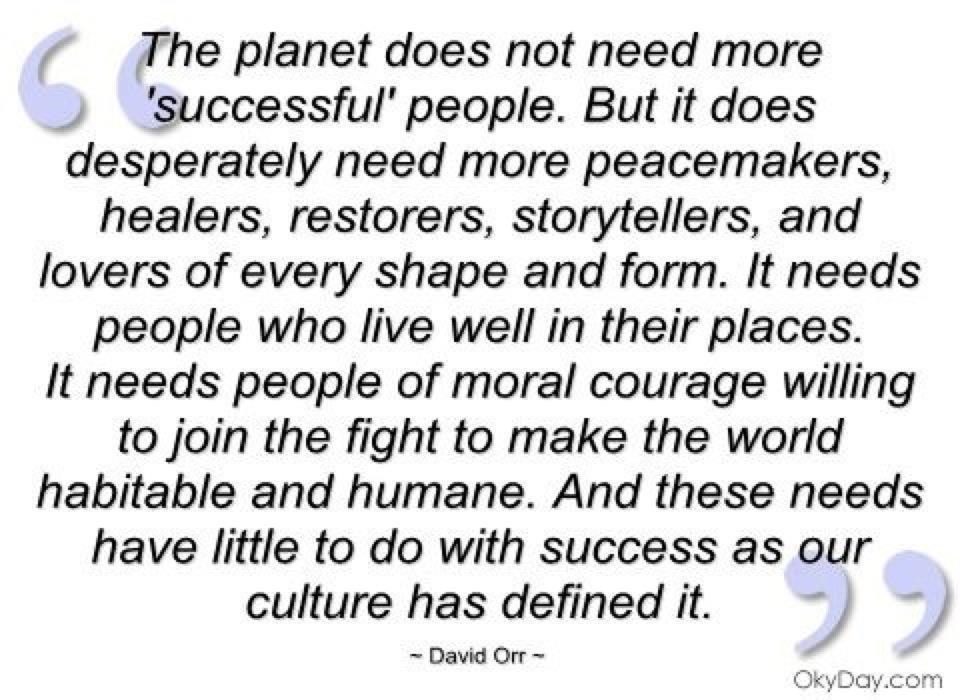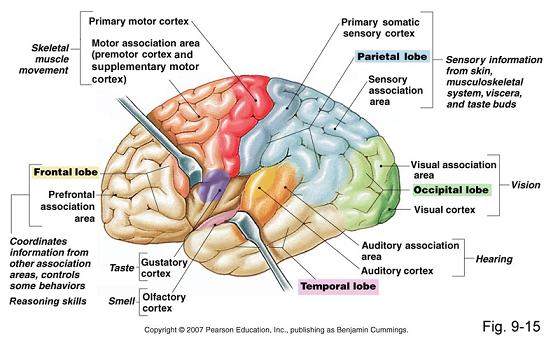
Update: In order for students to have a voice, and to learn how to advocate for their gifted needs, I constantly ask the students to name the things they wish the teachers understood about gifted learners. Here are the most recent items they listed for educators to know:
Original post: 9/25/15
I asked them to write things they wish their teachers knew about gifted students in middle school. I asked them to tell me what they need from school from their perspective. They responded in bold colors, with heartfelt messages. PRISM students came back all day to add to the wall to have their unique voices heard.
*In the days following this activity, the writing remained on the board and the students and I reflected on their messages. Over the course of 4 days, the students have re-read their statements and some have said that their frustrations made their comments sound meaner than their original intent. Nonetheless, when we give students a voice, we need to listen. Their feedback was honest and as their champion I am giving them a place to share and learn how to be empowered advocates for their needs as gifted learners. Links to resources for each statement have now been added as a caption and our hope is that educators will take this opportunity to reflect on their own practices to ensure all of our students are being given the opportunities they deserve to flourish in our schools.
 |
| https://onlinelearninginsights.wordpress.com/2013/02/13/how-the-student-voice-can-make-education-better/ |
 |
| http://crushingtallpoppies.com/2015/04/01/anxiety-in-gifted-children-3-simple-steps-parents-and-educators-can-take/ |
 |
| http://www.davidsongifted.org/db/Articles_id_10129.aspx |

 |
| http://sengifted.org/archives/articles/the-gifted-identity-formation-model-in-search-of-the-gifted-identity-from-abstract-concept-to-workable-counseling-constructs |
 |
| http://www.byrdseed.com/five-unexpected-traits-of-gifted-students/ |
 |
| http://www.gifted.uconn.edu/nrcgt/hennesse.html |
 |
| http://www.davidsongifted.org/db/Articles_id_10514.aspx |
 |
| http://podcasts.shelbyed.k12.al.us/lsherrell/files/2015/02/Differentiating-for-Gifted-Learners.pdf |
 |
 |
| http://www.gifted.uconn.edu/siegle/tag/Digests/e607.html |
 |
| http://www.gifted.uconn.edu/nrcgt/kennarch.html |
 |
| http://learning.blogs.nytimes.com/2014/10/07/50-ways-to-teach-current-events/?_r=0 |
Links for more information:
What it Means to Teach Gifted Learners Well
Gifted Kids at Risk: Who’s Listening?
Competing with Myths about the Social and Emotional Development of Gifted Students
National Association for Gifted Children Standard 4: Learning Environments
Ten reasons why your gifted child procrastinates
Cybraryman’s What Students Want Page
Your Know Thyself project should be shared with me no later than 9/29 at rebecca.mclellandcrawley@wwprsd.org. If you select a paper option, bring it to me in the PRISM room by 9/29.
Homework: Play outside!
Don't forget: our PRISM calendar is on the site. Know what days we meet and attend only those sessions.
The PRISM Open House will be held from 5:30pm-6:30pm on October 5. We will review the programs and expectations for the school year.
What is your Keirsy temperament? Take this quiz to find out.

What does this mean for you as a collaborative team member? What does this mean for you in life? How will you make your mark?
Want more information on Keirsy?
9.21.15 PRISM for ALL


Review:
Sleep and the Teen Brain
 |
How many hours should you be sleeping each night?
How does electronic use before bedtime interfere with your brain’s ability to rest and process information?
Why is sleep so important for long-term memory?
Long-Term Memory

Explain the 10/24/7 rule.
Why is it important to review material each day in small chunks instead of cramming right before a test?
How can we make stronger neural pathways?
Multiple Intelligences and Growth Mindset

What are the 9 multiple intelligences defined by Howard Gardner?
Why is it more valuable to build a team of different types of thinkers instead of relying on one predominant strength?
What is a growth mindset?
Tonight:
Are You Left Brain or Right Brain - TeacherTube
What are the strengths of the right brain thinkers?
What are the strengths of the left brain thinkers?
How can you use these strengths to build a more powerful, collaborative, problem-solving team?
Reminder: The FPS workshop is on 10/2. Return your permission slips ASAP! No permission slips will be accepted after this Friday.
Always check our schedule!
https://docs.google.com/presentation/d/10PyFNG2NHIObO0cWOHodDAy4i5uz0lUa2JieFlD_0EM/edit?usp=sharing
FPS Permission Slips are due back to me by ASAP, but due to space constraints, the workshop is first-come, first-served. We can only accommodate 80 participants. No permission slips will be accepted after 9/25. If you are seriously interested in participating in FPS this year, return your signed permission slip to me ASAP!
Understanding my tween/teen brain.
Let's build on our talents and strengths. You are working to become a strong researcher with the tools necessary for this year and beyond. Your success in high school and college begin with the strong foundation you build for yourself in middle school. Find your passion!
Here are two links to resources for better studying habits. Kick the cramming habit now!
Strategies for Successful Students
Tips from a Middle School Teacher
Why is the Prefrontal Cortex considered the CEO of your brain?
HW:
Watch at least one part/segment of The Teen Brain.
http://www.pbs.org/wgbh/pages/frontline/shows/teenbrain/view/
You are to complete viewing the ENTIRE program by Monday, September 21, and complete any 10 of the following questions for a group discussion:
- Parents may feel that for a brief period of time that their teenager is inhabited by…..?
- When will the period of rapid brain growth occur again for baby Natalie?
- What brain function is associated with gray matter?
- What did most people mistakenly believe about brain development?
- At what age has the brain reached 95% of its development?
- Explain what the brain grows like?
- Explain the “use it or lose it” principle in relation to brain development.
- Describe what the pre-frontal cortex is in charge of (ie. what it does).
- Where in the brain does the change occur that helps teens to regulate their emotions and solve problems effectively?
- In the study conducted at McLean hospital, how did teen brains compare to adult brains? (ie. describe the differences)
- What do the results of the McLean hospital study suggest about teen brains?
- Based on the findings from the McLean study, explain why miscommunication between teens and adults might occur?
- Explain why teens read emotions differently than adults
- How much sleep does an average teen get?
- What is the optimal amount of sleep that a teenager needs?
- What is the concern about teens with regards to their sleep patterns?
- What does your brain do while sleeping after learning a new skill?
8th Graders: Also watch the Ted Talk by Peter Doolittle - "How your working memory" makes sense of the world" and take notes on his interesting points about the brain. You should have at least 5 bullet points in your notes.
REMINDER: FPS permission slips are due ASAP for the 10/2 training. Only 80 students can participate in the event.
Sit at the table labeled with your strongest intelligence.
Discuss these questions with your peers:
- What does this mean for you as a learner?
- What strategies work best for you when learning new material?
- What does this mean for you as a collaborative team member moving forward?


Do you know your brain? We focus mainly on the frontal lobe, but review the video from Bozeman Science and take notes on the major parts of the brain. What are the functions of these structures? He reviews the structures at 10:54 on the video.
http://biology.about.com/od/humananatomybiology/a/anatomybrain.htm
HW:
*7th graders: You know your strengths as a learner. What habits can you put into place to fill in gaps? Check this out.
Read the article from Medical Daily.
Come prepared to discuss parts of the article that stood out to you based on what we are learning and your knowledge of science.
What is neuroplasticity or brain plasticity? Click here to find out more!
*8th graders: Read this article on stress and the teen brain. What is the role of the prefrontal cortex? Why is it important to find ways to reduce stress as a teenager? What daily habits can increase dopamine and decrease cortisol?
What is neuroplasticity or brain plasticity? Click here to find out more!
What is the PRISM philosophy?
What does PRISM stand for and what does it mean to you?
PRISM HW:
Multiple Intelligence Theory
Go to: http://goo.gl/esJtvk
Take the assessment and copy down your results and your CODE. Bring them to PRISM on Tuesday.
Preview this short video on famous failures - http://lucarinfo.com/inspire/dgifted.html
What does this mean for you as a modern problem solver? What can we all learn from not being successful on our first attempt?
Your Know Thyself project should be shared with me no later than 9/29 at rebecca.mclellandcrawley@wwprsd.org. If you select a paper option, bring it in by 9/29.
Don't forget: our PRISM calendar is on the site. Know what days we meet and attend only those sessions.
| Problem # 1 | Treatment of Animals Due 10/30/15 5pm | |
| Problem # 2 | Disappearing Languages Due 12/11/15 5pm | |
| Qualifying Problem | Recovering from Natural Disaster Due 1/22/16 5pm | |
| State Competition | The Global Workplace Due 3/4/16 5pm |
 |
| http://www.fpspi.org/topics.html |
 |
| http://www.fpspi.org/topics.html |
Parents and students can stay up to date on all the activities of the PRISM room by subscribing to our Remind service. See the instructions below.
If you signed up last year, please sign up for this year's PRISM group.
Attention 7th and 8th graders:
PRISM for ALL begins September 15 during FLEX in the Media Center!
Thinking about PRISM this year? You must attend all of the sessions. This is the foundation curriculum for PRISM and attendance is mandatory.
9/15, 9/16, 9/17*(room 616), 9/21, 9/22, 9/24*(room 616) and 9/28
See Dr. McLelland-Crawley in room 814 for more information!
The FPS all day workshop will take place on Friday, October 2. All students interested in Future Problem Solving must attend the workshop. See Dr. McLelland-Crawley for a permission slip.
Students will not be permitted to participate in Future Problem Solving if they do not attend this workshop. This "in-school field trip" will take place in the Media Center and students must attend all-day (i.e., they will not be excused from the workshop for Band/Orchestra lessons, quizzes, etc.). When students get the permission slip for this program, it indicates that it's their responsibility to advise their teachers that they will not be in class that day, and it's also the student’s responsibility to make up missed work or lessons.
Practice Problem #1 is due on 10/30/15 by 5pm.
Practice Problem #1 is due on 10/30/15 by 5pm.
I will be going into the 6th grade science classrooms before the end of September to provide an overview of the PRISM program to all students. Check our calendar for the date your science teacher selected.
The Media Specialist will be hosting a workshop for any interested researchers on 10/15 and 10/16 during FLEX and after school (both dates are 1/2 days). Students who want a refresher on NoodleTools or want to learn more about online resources should sign up ASAP to secure a spot.
The PRISM Open House will be held from 5:30pm-6:30pm on October 5. We will review the programs and expectations for the school year.
The Media Specialist will be hosting a workshop for any interested researchers on 10/15 and 10/16 during FLEX and after school (both dates are 1/2 days). Students who want a refresher on NoodleTools or want to learn more about online resources should sign up ASAP to secure a spot.
The PRISM Open House will be held from 5:30pm-6:30pm on October 5. We will review the programs and expectations for the school year.
Subscribe to:
Posts (Atom)

























